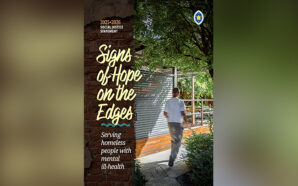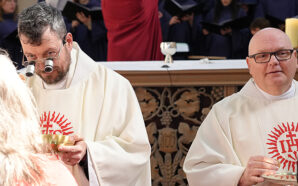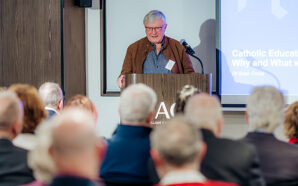15th Sunday in Ordinary Time
Readings: Deuteronomy 30:10-14; Psalm 69; Colossians 1:15-20; Luke 10:25-37
13 July 2025
The parable of the Good Samaritan is known by all of us. Even our most secular neighbours and atheist friends have heard of it and appreciate its lesson, or at least acknowledge its challenge. Jesus, a Jew, tells the story of a Jew who lies helpless by the roadside. His fellow Jews with civil and religious authority pass by the injured man, or worse still cross to the other side of the road. Then comes a Samaritan. In those days Samaritans and Jews did not speak to each other. Many of them despised each other. But it’s the Samaritan, the stranger, who comes to the rescue, proving himself to be neighbour to the one in need. The Samaritan makes himself neighbour to one who is a stranger.
In 1932, the House of Lords decided a famous negligence case Donoghue v Stevenson. Lord Atkin wrote: ‘The rule that you are to love your neighbour becomes in law, you must not injure your neighbour; and the lawyer’s question, Who is my neighbour? receives a restricted reply. You must take reasonable care to avoid acts or omissions which you can reasonably foresee would be likely to injure your neighbour. Who, then, in law, is my neighbour? The answer seems to be–persons who are so closely and directly affected by my act that I ought reasonably to have them in contemplation as being so affected when I am directing my mind to the acts or omissions which are called in question.’ [1]
For most of us Christians, Lord Atkin’s legal definition of neighbour often neatly matches the circumference of our moral concern for the stranger. We look after our own. And we make sure we don’t cause harm to others. And we leave it there. Surely that’s enough. What more can you reasonably expect of a good citizen or even a committed Christian?
In his encyclical Fratelli Tutti, Pope Francis challenged us to revisit the all too familiar parable of the Good Samaritan and to see it as a call for us all to be ‘neighbours without borders’. Francis put it this way: ‘Jesus told the parable of the Good Samaritan in answer to the question: Who is my neighbour? The word “neighbour”, in the society of Jesus’ time, usually meant those nearest us. It was felt that help should be given primarily to those of one’s own group and race. For some Jews of that time, Samaritans were looked down upon, considered impure. They were not among those to be helped. Jesus, himself a Jew, completely transforms this approach. He asks us not to decide who is close enough to be our neighbour, but rather that we ourselves become neighbours to all.’[2]
We are challenged ‘to put aside all differences and, in the face of suffering, to draw near to others with no questions asked. I should no longer say that I have neighbours to help, but that I must myself be a neighbour to others.’[3] Francis was unapologetic that ‘this encounter of mercy between a Samaritan and a Jew is highly provocative; …it challenges us to expand our frontiers. It gives a universal dimension to our call to love, one that transcends all prejudices, all historical and cultural barriers, all petty interests.’[4]
As pope, Francis made a habit of challenging those of us in wealthy, secure, democratic countries (like Australia and the United States) to welcome the stranger, particularly asylum seekers arriving on our doorstep. US Vice President J D Vance, a Catholic who takes every opportunity to meet a pope, challenged Francis in his reading of the demands of Jesus. Invoking the Augustinian idea of ordo amoris, Mr Vance said:
‘[A]s an American leader, but also just as an American citizen, your compassion belongs first to your fellow citizens. It doesn’t mean you hate people from outside of your own borders. But there’s this old-school [concept] — and I think a very Christian concept, by the way — that you love your family, and then you love your neighbour, and then you love your community, and then you love your fellow citizens in your own country, and then after that you can focus and prioritize the rest of the world.’[5]
Shortly before his death when his health was badly failing, Francis took up Mr Vance’s challenge with the assistance of an American Augustinian cardinal in Rome. Francis wrote to the US bishops refuting Mr Vance’s attempt to neutralise the parable. The cardinal who rendered assistance with the letter was none other than the one who is now Pope Leo XIV. On 10 February 2025, Francis wrote:
‘Christian love is not a concentric expansion of interests that little by little extend to other persons and groups. In other words: the human person is not a mere individual, relatively expansive, with some philanthropic feelings! The human person is a subject with dignity who, through the constitutive relationship with all, especially with the poorest, can gradually mature in his identity and vocation. The true ordo amoris that must be promoted is that which we discover by meditating constantly on the parable of the “Good Samaritan”, that is, by meditating on the love that builds a fraternity open to all, without exception.’[6]
None of us can ever succeed in extending fraternity open to all 8 billion people on the face of the earth. But neither can we justify ourselves by confining our attention to our own intimate circle while pledging to do no harm to those outside the circle. If we care only for our own, we are failing to meditate on the parable. In your meditation, be consoled by the thought that not even the Good Samaritan could do it on his own. He needed the help of a Jewish innkeeper who would care for the wounded one and who was prepared to trust an itinerant Samaritan. We can extend fraternity to all only by being in community and in communion at the table of the Lord.
Turn to the Lord in your need, and you will live.
I pray to you, O Lord,
for the time of your favour, O God!
In your great kindness answer me
with your constant help.
Answer me, O Lord, for bounteous is your kindness:
in your great mercy turn toward me.
Turn to the Lord in your need, and you will live.
[1] Donoghue v Stevenson [1932] A.C. 562, 580.
[2]See http://www.vatican.va/content/francesco/en/encyclicals/documents/papa-francesco_20201003_enciclica-fratelli-tutti.html #80.
[3] Ibid, #81.
[4] Ibid, #83.
[5] See
[6] See https://www.vatican.va/content/francesco/en/letters/2025/documents/20250210-lettera-vescovi-usa.html, #6.








